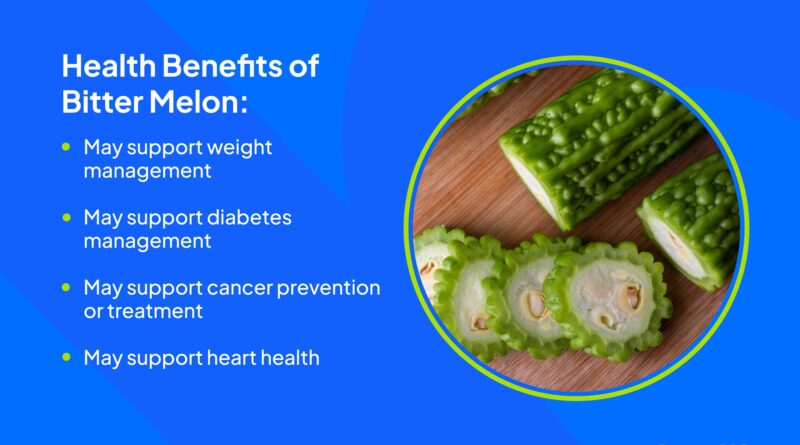Bitter Melon: Benefits, Nutrition, and Risks

Bitter melon (Momordica charantia), also known as bitter gourd, comes from a vine native to India and other Asian countries. It’s a member of the squash family and produces an oblong, green fruit that looks similar to a cucumber with a bumpy exterior. Bitter melon can be eaten raw, but it’s very bitter with no sweetness. The fruit is more commonly cooked and used in dishes or teas. Bitter melon extract is also used medicinally.
Some research suggests bitter melon may help treat inflammatory conditions like obesity, type 2 diabetes, and cancer. It contains a natural compound that acts like insulin to help regulate blood sugar levels. However, longer and more reliable human studies are needed to determine the effects of bitter melon on various conditions, including blood sugar regulation, blood pressure, cholesterol, and body weight.
Bitter melon has not been approved as a medication for treating diabetes or other medical conditions by the U.S. Food and Drug Administration (FDA). However, bitter melon extracts are sold as over-the-counter (OTC) dietary supplements in multiple forms, including liquid, powders, and tablets.
Design by Health / Getty Images
After an injury or infection, short-term inflammation assists your body with healing. However, ongoing inflammation can play a role in tissue injury and disease. Chronic low-grade inflammation, which can linger for months or years, is a known contributor to more than half of deaths worldwide.
A research review concluded that bitter melon possesses potent anti-inflammatory properties. As a result, the plant may be beneficial for reducing inflammation and managing inflammation-related conditions.
In one small study, 38 patients with knee osteoarthritis were treated daily for three months with a commercially available bitter melon supplement and were compared to 37 patients who took a placebo. After three months, the bitter melon group has significantly reduced body weights and fasting blood sugar levels.
There were also significant improvements in Knee Injury and Osteoarthritis Outcome Scores and reductions in analgesic scores (pain levels) in the participants who consumed bitter melon. The placebo group also had significant improvements in certain Outcome Scores, but they reported increased analgesic (pain) levels.
According to government data, the prevalence of obesity in the United States increased from 30.5% in 1999 to 41.9% in 2017. Obesity-related conditions include heart disease, stroke, type 2 diabetes, and certain cancers. These are among the leading causes of preventable, premature death.
Some research points to bitter melon helping support healthy weight management, but results are mixed. Much of the research has been conducted in animals, which shows that the plant increases carbohydrate utilization and curbs fat gain.
A small, randomized, double-blind, placebo-controlled clinical trial carried out in 24 patients with obesity over 12 weeks found that a group of 12 who consumed bitter melon supplements saw some reductions in body weight, body mass index, waist measurements, and body fat percentage. However, the differences did not reach statistical significance.
Some studies have also seen weight loss and improvements in people with type 2 diabetes. Still, more research is needed to reach a stronger conclusion about the effectiveness of bitter melon for weight management.
One in three adults in the U.S. has prediabetes, and 80% don’t know they have the condition. If untreated, prediabetes could develop into type 2 diabetes within five years, which increases the risk for serious health problems, including heart attack, stroke, and kidney failure.
Some of the most promising research about bitter melon relates to its effect on blood sugar regulation, but studies are inconclusive. One research review found that while bitter melon has the potential to be a safe, effective, and lower-cost option for people with type 2 diabetes complications, the plant’s application in medicine is still in the initial processing stages.
One small randomized, double-blinded, placebo-controlled clinical trial of 24 patients with type 2 diabetes compared bitter melon in capsule form to a placebo over three months. The bitter melon group experienced significant decreases in weight, body mass index (BMI), body fat percentage, waist measurements, hemoglobin A1c (a measure of blood sugar regulation over a previous three-month period), and blood sugar levels. There was also a significant increase in total insulin secretion.
However, in a recent analysis of nine previously published studies with 414 patients and 4–16 weeks of follow-up, no significant effects were seen for bitter melon treatment over placebo on several outcomes, including fasting blood sugar levels and body weights.
Cancer is the second leading cause of death in the U.S. Some research points to bitter melon’s ability to fend off or treat cancer, but more studies are needed to draw definitive conclusions.
Bitter melon has strong antioxidant and anti-inflammatory effects that may contribute to cancer prevention. In addition, natural compounds found in bitter melon may help kill certain cancer cells or prevent them from growing and spreading. However, much of the research has been done in rodents and isolated cancer cells.
Scientists say extracts or pure bitter melon may be used alongside conventional therapy for additional cancer treatment management. However, further in-depth studies are needed to design appropriate cancer-fighting interventions.
Heart disease is the leading cause of death in the U.S. There are several factors that increase the risk of developing heart disease, including diabetes, overweight and obesity, hypertension (high blood pressure), and high cholesterol.
Following animal studies, researchers in Japan conducted a study on the effects of bitter melon on high low-density lipoprotein (LDL) cholesterol, the type of cholesterol known to increase cardiovascular disease risk. In this randomized, double-blind, placebo-controlled trial, 43 adult volunteers received either 100 milligrams (mg) of hot-water extracts of bitter melon or a placebo three times a day for 30 days.
There were no significant changes in either group in terms of body weight, body mass index, systolic (the top number) or diastolic (the bottom number) pressure, total cholesterol, “good” high-density lipoprotein (HDL) cholesterol, triglycerides (blood fats), or blood sugar levels. However, the bitter melon group did experience a significant drop in “bad” LDL cholesterol compared with the placebo group.
Researchers say the results suggested that bitter melon extracts might effectively lower LDL levels in humans and offer potential therapeutic value for cholesterol management.
In addition to its anti-inflammatory and antioxidant effects, which support immune function, bitter melon has been shown to have antibacterial and antiviral properties. Bitter melon essential oils have shown to fight Staphylococcus aureus (S. aureus) and other bacteria like E. coli. However, researchers say the application of bitter melon in food and pharmaceutical fields is still in the initial stages. The benefits are far from fully understood.
Fresh bitter melon can be used in a variety of recipes. One-half cup of raw bitter melon provides:
- Calories: 10
- Fat: 0 grams (g)
- Sodium: 0 milligrams (mg)
- Carbohydrates: 2 g
- Fiber: 1 g
- Protein: 0 g
- Vitamin C: 42 mg, or 56% of the Daily Value (DV)
Vitamin C acts as an antioxidant and helps the body absorb iron. It is needed to support your skin, bones, and connective tissue. Vitamin C also supports collagen production, wound healing, protein metabolism, and immune function.
The risks of eating bitter melon may vary depending on the form and amount you use. In general, bitter melon can interact with certain medications and dietary supplements that affect blood sugar. For example, taking bitter melon with diabetes medications might cause blood sugar to drop too low. Bitter melon can also interact with pazopanib, a cancer medication. It might increase how much of the drug stays in the body, possibly increasing its side effects.
As a supplement, bitter melon extracts are usually well-tolerated, but side effects can include abdominal discomfort, heartburn, constipation, diarrhea, nausea, vomiting, dizziness, headache, and low blood sugar.
Rare but potentially severe adverse effects include severe hypoglycemia (low blood sugar) coma, and seizures. In addition, bitter melon should never be used during pregnancy or in women of childbearing age who are not using effective contraception.
Other potential side effects of bitter melon include fatigue, skin rash, and kidney function problems. Large amounts of bitter melon juice concentrate have been shown to lead to stomach ulcers and intestinal bleeding.
Always avoid bitter melon if you have allergies to other plants in the Cucurbitaceae family, including cucumber, melon, and squash.
There are many recipes online that incorporate fresh bitter melon. Here are some ideas:
- Serve it with tofu or eggs as part of a breakfast scramble
- Add it to various stir fries
- Incorporate it into soups or stews
- Add it to curries
- Stuff it with onions and spices and cooked in an instant pot
Because of its bitter nature, it may be best to utilize recipes that have been tested by an experienced chef or cook if you’re new to using bitter melon.
Bitter melon can be consumed as a non-sweet fruit or in supplement form. While animal and preliminary human studies are promising, scientists call for more studies to confirm the plant’s benefits and the best potential forms and ways to consume it.
Bitter melon can also interact with prescription medications, cause an allergic reaction, and have potentially serious side effects. Talk to your healthcare provider before adding bitter melon to your diet to determine if its right for you.





